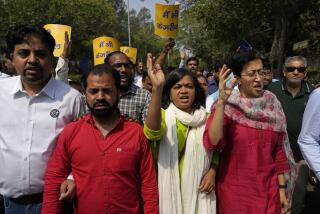Thousands hail Indian activist’s return from prison
A popular anti-corruption activist who was arrested this week and refused to leave his prison cell until India’s government met his terms for a hunger strike left prison Friday morning to a triumphant welcome from thousands of supporters, some of whom have camped out for three days.
“Victory to mother India,” said septuagenarian activist Anna Hazare, waving an Indian flag. “The fight is far from over, it has just begun.”
The end of the unusual standoff occurred when government officials granted him the right to continue his protest for up to two weeks at a large venue, rather than three days at a smaller field they’d originally insisted on. His fast began in jail.
As the unlikely grassroots hero threaded his way to an open truck, he and his aides warned supporters not to become violent or block traffic. Thousands, however, followed his vehicle in cars and motorcycles, chanting and singing despite the rainy weather.
The political crisis started when the ruling Congress Party, hoping to avoid political embarrassment, ordered Hazare’s arrest on Tuesday as he was about to begin his “fast unto death.” The move backfired, however, when thousands of people across India, fed up with the country’s deep-seated corruption, rallied to his defense.
The government then backed down and granted him bail Tuesday night, only to have him insist on staying in prison until officials dropped 22 conditions related to his hunger strike.
India has seen a spate of scandals involving telecommunications, defense and sports management allegedly involving tens of billions of dollars.
Hazare is trying to pressure parliament to pass his version of a bill that would create an anti-graft ombudsman, or lokpal, with broad-based powers. The government wants the ombudsman to be merely advisory and not have authority over the prime minister’s office or senior judges.
Hazare supporters see him as a man of conviction able to stand up to the government on a crucial issue. Critics accuse him of trying to bypass parliament’s authority and use public pressure to blackmail the government.
Supporters praised the deal leading to Hazare’s release.
“I am very happy that ultimately good sense has prevailed on the government and it has agreed to permit Anna to fast for 14 days,” Shanti Bhushan, a former law minister and Hazare advisor, told the media.
In recent days, there’s been a party atmosphere outside Tihar prison as people danced, chanted, lighted candles and wore mock handcuffs to express their support for the activist housed inside.
Elsewhere around India, people showed their support with motorcycle rallies, nonstop bell ringing, sympathy hunger strikes, promises to build a temple in his honor and by not bathing, since Hazare wasn’t able to wash in prison. And in Mumbai, thousands of “dabbawallas” who pick up and deliver home-cooked lunches, mounted a one-day strike, supposedly the first in a century, in solidarity with Hazare’s hunger pangs.
Others expressed more measured backing.
“The movement is for the right cause, but I don’t think the methods employed are correct,” said Radhika, a university researcher, who declined to give her last name. “It would have been better if they had been more diplomatic and used more civilized language in expressing their motives and intentions. To call Prime Minister Manmohan Singh a thief, does that help the bill’s passage?”
One last-minute snag Thursday involved the muddy conditions at Ramlila Ground, the venue for the public portion of Hazare’s hunger strike. The location, Ramlila Ground, was too muddy, Hazare’s aides complained, and needed cleaning before they’d go ahead.
If anything, the rain Friday created more mud, initially attracting smaller crowds than expected at the grounds, although they continued to build as word spread of his release. Colleagues also said Hazare would not in fact fast until he expired or got his way, as earlier indicated. Rather, they said, he would avoid eating only so long as his health was not in jeopardy.
Aarushi Sinha in the Times’ New Delhi bureau contributed to this report.
More to Read
Start your day right
Sign up for Essential California for news, features and recommendations from the L.A. Times and beyond in your inbox six days a week.
You may occasionally receive promotional content from the Los Angeles Times.






